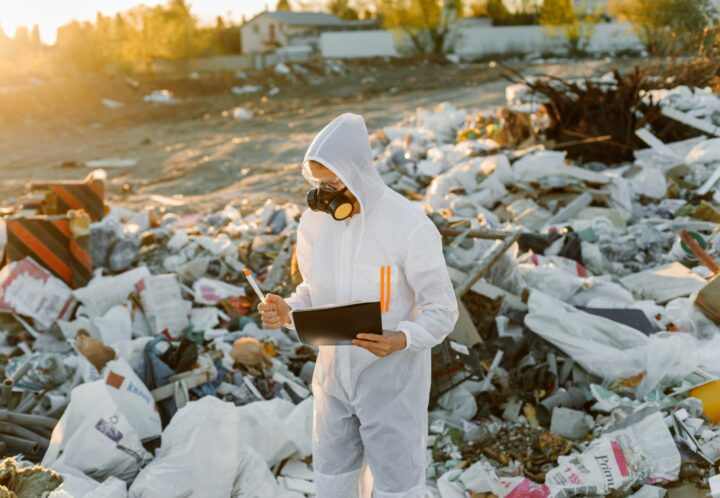The following contribution is from another author.
In the fast-paced construction world, efficient and eco-friendly waste management often overshadows other priorities. However, the growing concerns about environmental sustainability have brought a significant shift in this narrative. Many innovative companies are spearheading a movement to revolutionize construction cleanup by integrating advanced junk removal strategies. These efforts can streamline the cleanup process and contribute significantly to environmental conservation.
This article explores how to revolutionize construction cleanup through junk removal.
The Rise of Eco-Conscious Construction Practices
The transformation in construction practices towards eco-consciousness reflects a paradigm shift in the industry’s approach to environmental responsibility. Previously, construction activities were major contributors to environmental degradation, primarily through substantial waste generation, leading to landfill overuse and increased pollution. This traditional approach has been reevaluated recently due to escalating environmental concerns and a more informed public.
Modern construction now embraces sustainable methodologies, emphasizing reduced waste production and enhanced recycling efforts. This shift is not merely a trend but a fundamental change driven by regulatory pressures, environmental awareness, and a societal call for greater corporate responsibility. The construction industry’s commitment to sustainable practices represents a proactive stance in addressing global environmental challenges, making it an integral part of the solution rather than a contributor to the problem.
Sustainable Junk Disposal: A Cornerstone of Modern Construction
A key component of this eco-conscious approach is sustainable junk disposal. This methodology focuses on collecting, sorting, and disposing of construction waste. By prioritizing recycling and repurposing of materials, sustainable junk disposal significantly reduces the environmental impact of construction projects. This approach ensures compliance with environmental regulations and aligns with the growing public demand for green construction practices.
Moreover, sustainable junk disposal aligns with current environmental regulations, providing a clear pathway for companies to demonstrate compliance. It also resonates with the growing consumer demand for environmentally responsible practices, enhancing a company’s market reputation. As a cornerstone of modern construction, sustainable junk disposal is a testament to the industry’s evolving ethos, reflecting its commitment to environmental stewardship and sustainable development.
Innovative Techniques in Construction Waste Management
Innovative waste management techniques have become increasingly pivotal in the quest for sustainable construction practices. These methods contribute to environmental preservation and enhance the efficiency and cost-effectiveness of construction projects.
Here’s a closer look at some of these groundbreaking techniques.
Advanced Sorting and Recycling
At the forefront of these innovations are advanced sorting and recycling systems. These sophisticated systems are designed to differentiate between recyclable and non-recyclable materials efficiently. The goal is to maximize waste diversion from landfills, thereby reducing environmental harm.
Using technologies like conveyor belts, air separators, and infrared sensors ensures that a higher percentage of construction waste is recycled, repurposed, or responsibly disposed of.
Material Recovery Facilities
Material Recovery Facilities (MRFs) represent a significant leap in waste management technology. These facilities are dedicated to sorting construction waste, extracting valuable materials that can be reused in the building process. MRFs use a combination of manual and automated processes to sort out metals, glass, plastics, and wood, ensuring that these resources are not wasted.
By reintegrating these materials into the construction cycle, MRFs play a crucial role in promoting a circular economy in the construction sector, reducing the need for new resources and minimizing waste.
On-Site Waste Processing
Another innovative approach is the implementation of on-site waste processing units by forward-thinking companies. These units process waste directly at the construction site, significantly reducing the need for waste transportation. This reduces transportation costs and carbon emissions associated with waste hauling.
On-site processing includes crushing concrete for reuse as an aggregate or compacting materials for easier transport. This approach is a testament to the industry’s commitment to reducing its environmental impact at every stage of the construction process.
Benefits of Revolutionized Construction Cleanup
The revolution in construction cleanup, driven by innovative waste management practices, presents many benefits beyond mere tidiness at construction sites. These advanced methods have transformed the industry, yielding significant environmental, economic, and regulatory advantages.
Below are the key benefits of this transformative approach to construction cleanup:
Environmental Impact Reduction
One of the most significant benefits of revolutionized construction cleanup is the considerable reduction in environmental impact. By minimizing reliance on landfills and prioritizing recycling, these practices substantially decrease the carbon footprint of construction projects. This approach leads to lesser exploitation of natural resources and a reduction in pollution and greenhouse gas emissions, playing a crucial role in combating climate change.
Cost-Effectiveness
Efficient waste management strategies in construction also translate to cost-effectiveness. Recycling and reusing materials often prove to be more economical than the continuous purchasing of new resources. By reducing waste, companies can cut down on disposal fees and the costs associated with waste transportation. Furthermore, the sale of recycled materials can generate additional revenue, making sustainability an environmental choice and a financially prudent one.
Regulatory Compliance and Reputation Enhancement
Adhering to sustainable waste management practices ensures compliance with increasingly stringent environmental regulations. This compliance is vital for avoiding legal penalties and meeting industry standards. Moreover, companies that adopt eco-friendly practices enhance their reputation, positioning themselves as responsible and forward-thinking. This appeals to environmentally conscious consumers and boosts the company’s standing in a competitive market, attracting clients and investors who prioritize sustainability.
Takeaway
The revolution in construction cleanup through junk removal is a testament to the industry’s commitment to environmental stewardship. The junk removal professionals are not just cleaning up construction sites but paving the way for a more sustainable future. As this movement gains momentum, it is poised to become an integral part of the global effort to combat environmental degradation, making construction not only about building structures but also about preserving the planet for future generations.

















octordle compared to Wordle and Quordle is somewhat different. With 13 guesses with eight different vertical lines, the player needs to solve all eight horizontal words at the same time